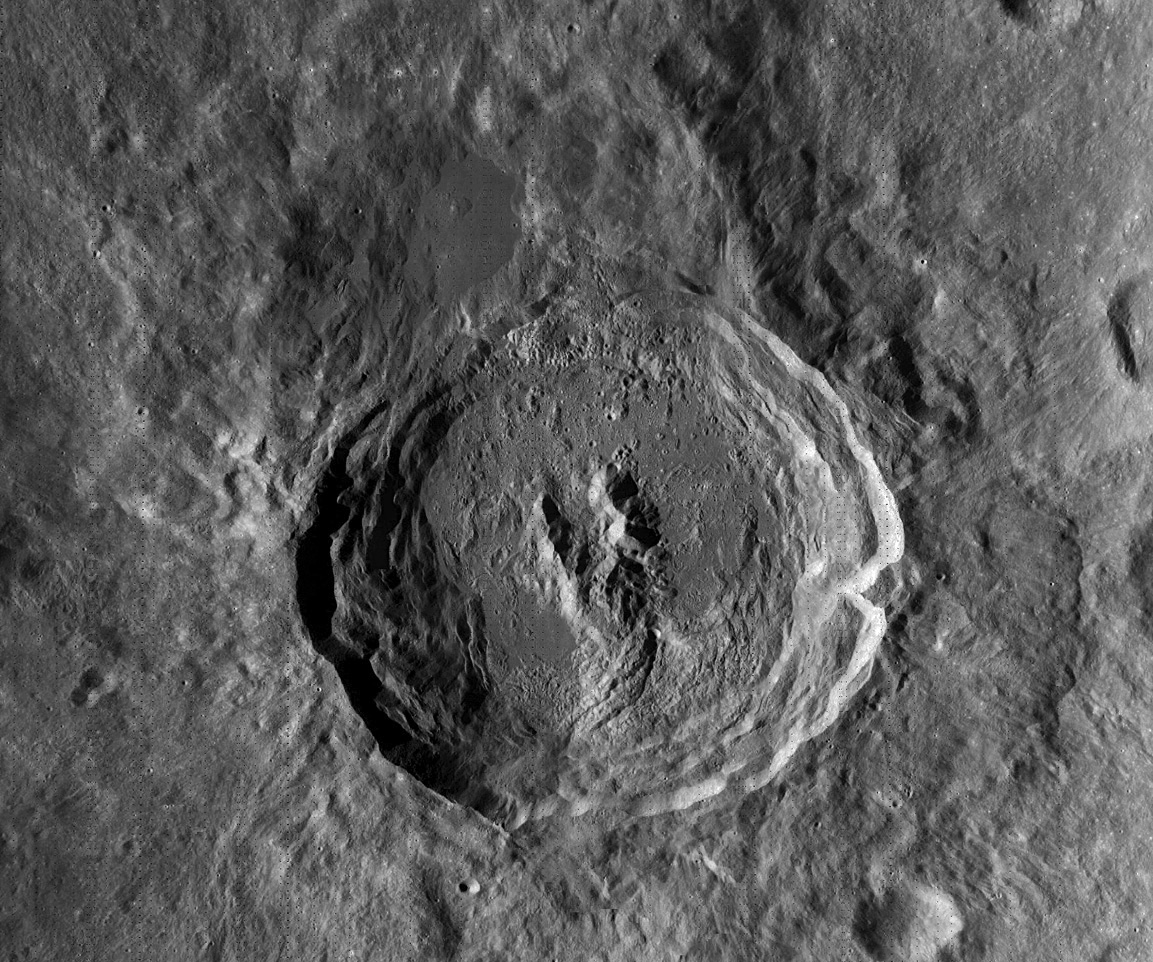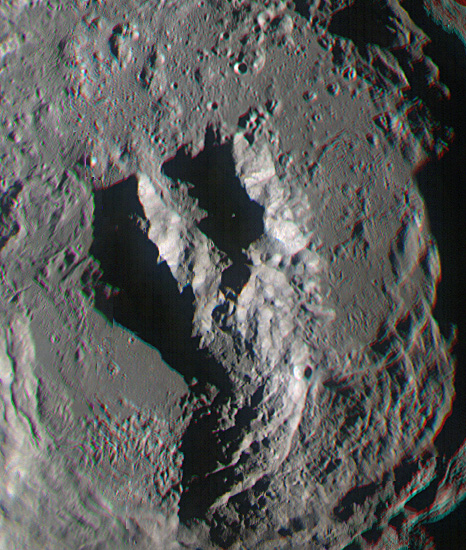Difference between revisions of "September 29, 2010"
| Line 6: | Line 6: | ||
<em>assembled from images by LRO/WAC/GSFC/ASU</em><br /> | <em>assembled from images by LRO/WAC/GSFC/ASU</em><br /> | ||
<br /> | <br /> | ||
| − | The crowning crater on the farside must go to [https://the-moon.us/wiki/King King]. It is a great 77km diameter crater hidden from our view on Earth at 5N, 120.5E, and is a [https://the-moon.us/wiki/stratigraphy Copernican] aged complex crater with an unusual claw shaped central peak, melt ponds and landslides in the walls. The peak is possibly caused by the rebound material going up and collapsing to the North. There are also impact melt ponds on the floor with some volcano like domes with vent-like craters in their tops which can be seen running in a line along the north-eastern floor in the closeup color [https://the-moon.us/wiki/LROC WAC] image below that I processed this afternoon. Are they of volcanic or impact origin? My guess is impact melt, but hard to tell. Also in [https://the-moon.us/wiki/ | + | The crowning crater on the farside must go to [https://the-moon.us/wiki/King King]. It is a great 77km diameter crater hidden from our view on Earth at 5N, 120.5E, and is a [https://the-moon.us/wiki/stratigraphy Copernican] aged complex crater with an unusual claw shaped central peak, melt ponds and landslides in the walls. The peak is possibly caused by the rebound material going up and collapsing to the North. There are also impact melt ponds on the floor with some volcano like domes with vent-like craters in their tops which can be seen running in a line along the north-eastern floor in the closeup color [https://the-moon.us/wiki/LROC WAC] image below that I processed this afternoon. Are they of volcanic or impact origin? My guess is impact melt, but hard to tell. Also in [https://the-moon.us/wiki/King_Y King Y], to the north, the floor is covered with smooth mare-like material. The south wall of King has collapsed inward onto the floor and external to the rim on the ejecta blanket to the east (right) it has a flow like appearance. Perhaps King was caused by an [[January_19,_2009|oblique impact]]. There is just so much to see and describe in this King of craters that I will let you go exploring!<br /> |
<br /> | <br /> | ||
[http://moonscience.yolasite.com/resources/King_color_mosaic_MCollins_M115529715CE.jpg [[File:King_claw_color.jpg]]]<!-- ws:end:WikiTextLocalImageRule:19 --><br /> | [http://moonscience.yolasite.com/resources/King_color_mosaic_MCollins_M115529715CE.jpg [[File:King_claw_color.jpg]]]<!-- ws:end:WikiTextLocalImageRule:19 --><br /> | ||
| − | Above: King's central peak and floor from WAC color image. The peaks have names, the west fork is called [https://the-moon.us/wiki/ | + | Above: King's central peak and floor from WAC color image. The peaks have names, the west fork is called [https://the-moon.us/wiki/Mons_Dieter Mons Dieter], the east fork [https://the-moon.us/wiki/Mons_Andr%C3%A9 Mons André] and the base that runs from the south wall is [https://the-moon.us/wiki/Mons_Ganau Mons Ganau].<br /> |
<br /> | <br /> | ||
[mailto:mauricejscollins@hotmail.com Maurice Collins]<br /> | [mailto:mauricejscollins@hotmail.com Maurice Collins]<br /> | ||
| Line 15: | Line 15: | ||
<strong>Technical Details</strong><br /> | <strong>Technical Details</strong><br /> | ||
Processed by Maurice Collins with Octave using [[September_1,_2010|Rick Evans' method]] from [http://wms.lroc.asu.edu/lroc/view_lroc/LRO-L-LROC-3-CDR-V1.0/M119055289MC M119055289MC_pyr] + [http://wms.lroc.asu.edu/lroc/view_lroc/LRO-L-LROC-3-CDR-V1.0/M119062083MC M119062083MC_pyr] + [http://wms.lroc.asu.edu/lroc/view_lroc/LRO-L-LROC-3-CDR-V1.0/M119068853MC M119068853MC_pyr] + [http://wms.lroc.asu.edu/lroc/view_lroc/LRO-L-LROC-3-CDR-V1.0/M119075647MC M119075647MC_pyr] --> [http://moonscience.yolasite.com/resources/King_M119062083MC_pyr_Octave_photometric_MCollins.jpg Full Image]<br /> | Processed by Maurice Collins with Octave using [[September_1,_2010|Rick Evans' method]] from [http://wms.lroc.asu.edu/lroc/view_lroc/LRO-L-LROC-3-CDR-V1.0/M119055289MC M119055289MC_pyr] + [http://wms.lroc.asu.edu/lroc/view_lroc/LRO-L-LROC-3-CDR-V1.0/M119062083MC M119062083MC_pyr] + [http://wms.lroc.asu.edu/lroc/view_lroc/LRO-L-LROC-3-CDR-V1.0/M119068853MC M119068853MC_pyr] + [http://wms.lroc.asu.edu/lroc/view_lroc/LRO-L-LROC-3-CDR-V1.0/M119075647MC M119075647MC_pyr] --> [http://moonscience.yolasite.com/resources/King_M119062083MC_pyr_Octave_photometric_MCollins.jpg Full Image]<br /> | ||
| − | Color image processed by Maurice Collins with LROC [https://the-moon.us/wiki/ | + | Color image processed by Maurice Collins with LROC [https://the-moon.us/wiki/Assembling_WAC_Images WAC previewer] from [http://wms.lroc.asu.edu/lroc/view_lroc/LRO-L-LROC-2-EDR-V1.0/M115516151CE M115516151CE] + [http://wms.lroc.asu.edu/lroc/view_lroc/LRO-L-LROC-2-EDR-V1.0/M115522919CE M115522919CE] + [http://wms.lroc.asu.edu/lroc/view_lroc/LRO-L-LROC-2-EDR-V1.0/M115529715CE M115529715CE] --> [http://moonscience.yolasite.com/resources/King_color_mosaic_MCollins_M115529715CE.jpg Full Image]<br /> |
Images stitched with [http://research.microsoft.com/en-us/um/redmond/groups/ivm/ICE/ Microsoft ICE]<br /> | Images stitched with [http://research.microsoft.com/en-us/um/redmond/groups/ivm/ICE/ Microsoft ICE]<br /> | ||
<br /> | <br /> | ||
<strong>Related Links</strong><br /> | <strong>Related Links</strong><br /> | ||
| − | [http://planetarynames.wr.usgs.gov/images/Lunar/lac_65_lo.pdf LAC 65] in IAU/USGS [https://the-moon.us/wiki/ | + | [http://planetarynames.wr.usgs.gov/images/Lunar/lac_65_lo.pdf LAC 65] in IAU/USGS [https://the-moon.us/wiki/USGS_Digital_Atlas Nomenclature Atlas]<br /> |
[http://www.nasa.gov/mission_pages/LRO/multimedia/lroimages/lroc-20100126-king.html LRO Featured Image]<br /> | [http://www.nasa.gov/mission_pages/LRO/multimedia/lroimages/lroc-20100126-king.html LRO Featured Image]<br /> | ||
[http://www.lpi.usra.edu/lunar/lunar_flyovers/king_crater/ King Crater Flyover]<br /> | [http://www.lpi.usra.edu/lunar/lunar_flyovers/king_crater/ King Crater Flyover]<br /> | ||
Latest revision as of 18:57, 13 October 2018
King for a Day

assembled from images by LRO/WAC/GSFC/ASU
The crowning crater on the farside must go to King. It is a great 77km diameter crater hidden from our view on Earth at 5N, 120.5E, and is a Copernican aged complex crater with an unusual claw shaped central peak, melt ponds and landslides in the walls. The peak is possibly caused by the rebound material going up and collapsing to the North. There are also impact melt ponds on the floor with some volcano like domes with vent-like craters in their tops which can be seen running in a line along the north-eastern floor in the closeup color WAC image below that I processed this afternoon. Are they of volcanic or impact origin? My guess is impact melt, but hard to tell. Also in King Y, to the north, the floor is covered with smooth mare-like material. The south wall of King has collapsed inward onto the floor and external to the rim on the ejecta blanket to the east (right) it has a flow like appearance. Perhaps King was caused by an oblique impact. There is just so much to see and describe in this King of craters that I will let you go exploring!

Above: King's central peak and floor from WAC color image. The peaks have names, the west fork is called Mons Dieter, the east fork Mons André and the base that runs from the south wall is Mons Ganau.
Maurice Collins
Technical Details
Processed by Maurice Collins with Octave using Rick Evans' method from M119055289MC_pyr + M119062083MC_pyr + M119068853MC_pyr + M119075647MC_pyr --> Full Image
Color image processed by Maurice Collins with LROC WAC previewer from M115516151CE + M115522919CE + M115529715CE --> Full Image
Images stitched with Microsoft ICE
Related Links
LAC 65 in IAU/USGS Nomenclature Atlas
LRO Featured Image
King Crater Flyover
Apollo Over the Moon: A view from Orbit
Heather, D. and Dunkin, S. (2003) "Geology and stratigraphy of King crater, lunar farside." Icarus 163, pp. 307-329.
Apollo 16 Preliminary Science Report 29-62
Yesterday's LPOD: Moonlit Nights
Tomorrow's LPOD: Amateurs vs LRO
COMMENTS?
Register, Log in, and join in the comments.



